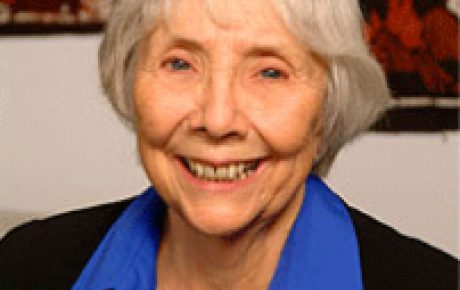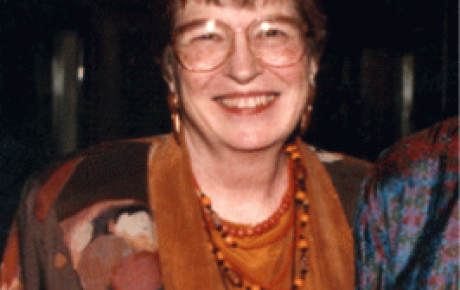A member of the National Council for Research on Women (NCRW), CSWS is one of more than 100 women's research and policy centers in the United States and among 300 centers in more than 80 countries. It is also one of the oldest of these centers, and it is the only UO research entity focused specifically on women and gender.
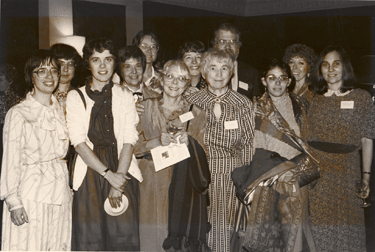
Confronting Gender Inequality (1970s)
Personal acts of physical freedom—such as going bra-less and not shaving legs—long ago reached the status of cliché in the annals of feminism, but they still mark the birth of a movement. As ‘60s activism turned the corner into ‘70s commitment, tangible action of another sort was taking place on the University of Oregon campus. A group of visionary scholars—both men and women—recognized the need to study, spotlight, and confront gender inequality throughout society. Joan Acker, Miriam Johnson, UO President Robert Clark and other notable faculty founded the Center for the Sociological Study of Women (CSSW) at the UO in 1973, on the heels of Title IX of the Education Amendments, as women’s roles in the United States and elsewhere were undergoing massive changes.
Acker, now professor emerita of sociology, remembered that in 1972, she and a small group of other women on the UO faculty asked the university to develop an affirmative action plan to increase the representation of women and minorities on campus (CSWS Review, Winter 2008).
“Our research revealed great disparity between women and men in status, research opportunities, and salaries,” she said. “But the UO would not consider establishing an affirmative action plan.” Accompanying Title IX came a federal executive order for all organizations that had more than $50,000 in funding from the federal government to establish such a plan. “So the UO did comply then because they had to,” Acker said. “But they wouldn’t do it when it was proposed from within.”
CSSW held a two-week feminist conference, campaigned for an affirmative action office, started a course on women, and began a research center that had as its first project a study of the status of women at the UO. Acker recalled some of their early research—the Feminism Scale. “The question that correlated most highly with who was most likely to identify with feminism was ‘do you shave your legs?’ We had a good laugh over that.”
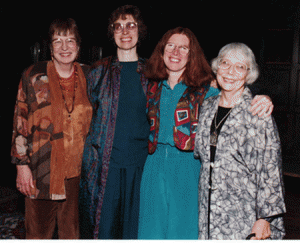
left: Miriam Johnson, Cheris Kamarae,
Sandra Morgen, and Joan Acker
(photo by Jack Liu).
Growing Flowers: The Harris Endowment in Honor of Jane Grant (1980s)
In 1983, CSSW became the much larger Center for the Study of Women in Society (CSWS), beneficiaries of the generous bequest of a man who loved a feminist. William Harris and Jane Grant grew flowers together—white flowers on a farm in Connecticut that became one of the leading plant nurseries in the country. But they also worked as journalists and editors—Jane Grant was one of the originators of The New Yorker magazine, and she recognized the need for research on women long before it generally became accepted in American academic life. At $3.5 million, the Harris-Grant endowment was at that time the biggest single gift ever awarded the UO—and it was all for the purpose of improving the status of women in society by increasing knowledge about women.
Joan Acker headed the original center and remembers that when the bequest came through: “We were one of only two research centers on women in the country at that time—still we were stunned by our good fortune, and our fantasies about the future were compelling and grandiose.”
Miriam Johnson, a Harvard Ph.D. and professor emerita of sociology who served as acting director of CSWS three times across three decades, noted: “There were more than a few who privately doubted if a ‘passing fad' like feminism had any business with 3 million dollars. What on earth would a ‘bunch of women' do with all that money?”
With the Harris endowment, CSWS expanded beyond its sociological roots toward multidisciplinary research—funding scholars from the humanities, the sciences, and the Law School who were conducting research on women. CSWS started a feminist library in its quarters at PLC, moved it to Hendricks Hall, and later passed it along to the UO Library.
In the late 1980s, CSWS developed cooperative projects with the UO Library's Special Collections; the art museum; women's studies; and the UO development fund and expanded its grant program by establishing grants for women of color and international graduate students studying women.
Cheris Kramarae said that during her years as acting director of CSWS (1988-1990), “many CSWS affiliates were working on vital issues virtually ignored by the people featured in the news magazines.” She listed a few of the projects funded in part by CSWS during those years: a film about women migrant workers and the dangers of pesticides; the lives of Macedonian (Gypsy) women; ecofeminism; lesbians as metaphor in women’s literature; the economy of prostitution in East Asia; violence in the lives of low-income black women; prenatal care for low-income women; children’s health; housing for battered women; women’s access to public office and financial credit; and AIDS education in Africa.
Sandra Morgen, who served as CSWS director from 1991-2006, early on described her goals for CSWS: “continuing to build a strong and vital community of scholars doing research on women, then connecting this group with other communities locally, regionally, and internationally. We plan to build strong links between researchers, educators, policymakers, and advocates concerned with improving the lives of women and their families.”
Morgen led CSWS through a time when the university was confronted by serious financial difficulties, and helped extend its reach throughout the university, the state of Oregon, the nation, and the world. She helped build CSWS’s research support mission toward three related activities: direct support of interdisciplinary, collaborative and/or innovative disciplinary research done by faculty, graduate students, and independent scholars; the center's own research initiatives; and the development and implementation of forums for scholars to share research and ideas.
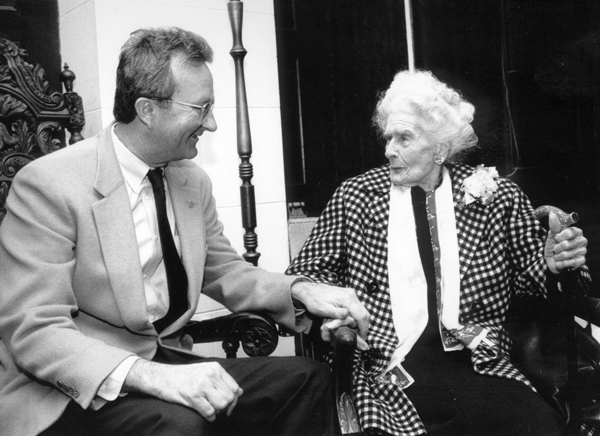
late Mazie Giustina, whose endowment helps
fund the CSWS research initiative Women
in the Northwest.
Research Initiatives and Research Groups: Building Intellectual Communities (1990s)
In fall 1992, CSWS began its research initiative Women in the Northwest (WNW), originally envisioned as a 5-year project to promote and spotlight research on women’s lives in the Pacific Northwest. A series on Welfare and Policy was among the publications that came out of this project. CSWS received a second large private gift in 1997 for $100,000 from Mazie Giustina, specifically endowing more work on WNW. From this expansion, a core group of researchers largely from the social sciences, history, and the professional schools developed ongoing research that linked theoretical, substantive, and policy concerns about women, work, families, economic restructuring, social policy, politics, and the law.
In 1994-95 CSWS instituted its Research Interest Group development grants, providing up to $10,000 to intentional communities of scholars with shared interests, out of which grew several new research initiatives, including the Feminist Humanities Project, the Wired Humanities Project, and the Women's Health and Aging Research Initiative. The latter, headed by Marie Harvey, received significant funding from the federal government for research focused on women's health issues.
A later expansion effort of Women in the Northwest created the Gender, Families, and Immigration in the Northwest (GFINW) Project, which generated research and analysis about gender and family dynamics among changing immigrant communities in the Northwest and made that research accessible to and in conversation with policymakers, social service providers, and immigrant rights advocates. Researchers affiliated with the project are currently engaged in research projects on Mexican immigrant youth and on the integration of immigrant families in rural Oregon.
By our 30th anniversary in 2004, CSWS had build intellectual communities by stimulating new perspectives and promoting meaningful dialogues through noon-time forums; conferences; research interest groups; Road Scholars presentations; and the funding of faculty and graduate research on women totaling more than $2 million for researchers in more than 20 departments over three decades.
—written by Alice Evans, CSWS Dissemination Specialist, 2009, based on earlier articles and reports.
See also: “40 Years Strong: A timeline of feminist research, teaching, and activism on campus” from the 2013 CSWS Annual Review, pp. 16–19.


